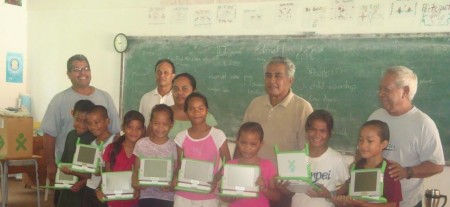Niue, a small island nation in the Pacific, became the first country to provide one laptop per child, over two years ago. At the time, OLPC Oceania was just taking shape; since then, another 8000 children and teachers have implemented programs across the Pacific.
Last week Niue’s acting Director of Education, Lisimoni Togahai, said that although the first two years went well, they were phasing out the program. “The school could not afford to pay for the high cost of maintaining the V-SAT that’s connected to the satellite for the internet access.”
Niue supported child ownership, and children there take their laptops home and keep them when they graduate. About half of the 500 XOs deployed belong to students who are still in the school system. While schools may be phasing out their subsidized connectivity, the children can use their XOs elsewhere. The country has abundant free wifi – it was touted as the first “Wifi nation” in 2003 for the availability of wifi in all of its cities.
Michael Hutak, coordinator for OLPC Oceania, has been in touch with them hoping for further background. He recently posted a summary of lessons learned so far from Pacific pilots. An excerpt:
* There is country-level demand and political and community support for OLPC in the Pacific;
* Small pilots provide an insufficient evidence base for policy makers;
* Monitoring & Evaluation should be integrated at the outset of an OLPC programme;
* Broad-based regional technical assistance is needed to aid country capacity building;
* Laptops and hardware peripherals should be centrally maintained in the region to efficiently support trials;
* There is suppressed demand for internet connectivity in rural and remote schools.
See also ChristophD’s take and Michael’s followup.


